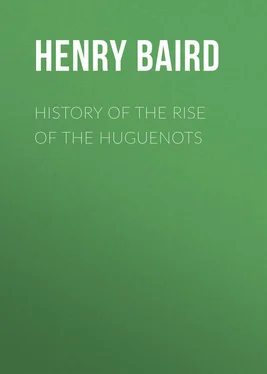Henry Baird - History of the Rise of the Huguenots
Здесь есть возможность читать онлайн «Henry Baird - History of the Rise of the Huguenots» — ознакомительный отрывок электронной книги совершенно бесплатно, а после прочтения отрывка купить полную версию. В некоторых случаях можно слушать аудио, скачать через торрент в формате fb2 и присутствует краткое содержание. ISBN: , Жанр: foreign_antique, foreign_prose, на английском языке. Описание произведения, (предисловие) а так же отзывы посетителей доступны на портале библиотеки ЛибКат.
- Название:History of the Rise of the Huguenots
- Автор:
- Жанр:
- Год:неизвестен
- ISBN:http://www.gutenberg.org/ebooks/30708
- Рейтинг книги:4 / 5. Голосов: 1
-
Избранное:Добавить в избранное
- Отзывы:
-
Ваша оценка:
- 80
- 1
- 2
- 3
- 4
- 5
History of the Rise of the Huguenots: краткое содержание, описание и аннотация
Предлагаем к чтению аннотацию, описание, краткое содержание или предисловие (зависит от того, что написал сам автор книги «History of the Rise of the Huguenots»). Если вы не нашли необходимую информацию о книге — напишите в комментариях, мы постараемся отыскать её.
History of the Rise of the Huguenots — читать онлайн ознакомительный отрывок
Ниже представлен текст книги, разбитый по страницам. Система сохранения места последней прочитанной страницы, позволяет с удобством читать онлайн бесплатно книгу «History of the Rise of the Huguenots», без необходимости каждый раз заново искать на чём Вы остановились. Поставьте закладку, и сможете в любой момент перейти на страницу, на которой закончили чтение.
Интервал:
Закладка:
She removes the king to Melun.
and thence to Fontainebleau.
Her painful indecision.
At length, Catharine de' Medici, apprehensive of the growing power of the triumvirate, and dreading lest the king, falling into its hands, should become a mere puppet, her own influence being completely thrown into the shade, removed the court from Monceaux to Melun, a city on the upper Seine, about twenty-five miles south-east of Paris. 51 51 "Whilst these assemblies were in the town, the queen mother conceived great jealousy (the King of Navarre being allied to the said duke [Guise]), lest she should be put from the government and the king taken from her hands, to prevent which she left Monceaux, her own house, for Orleans , thinking they were secure there, because the Prince of Rochesurion (being governor of the king's person and also of Orleans) was not conjoined with the King of Navarre, the Duke of Guise, and the constable, in their purposes. The King of Navarre, perceiving this, would not consent to the king going to Orleans, and, after great disputes betwixt the queen mother and him, she, with the king, were constrained to reside all this Easter at Fontainebleau." Throkmorton to the queen, March, 20, 1562, State Paper Office, Summary in Calendar.
She hoped apparently that, by placing herself nearer the strongly Huguenot banks of the Loire, she would be able at will to throw herself into the arms of either party, and, in making her own terms, secure future independence. But she was not left undisturbed. At Melun she received a deputation from Paris, consisting of the "prévost des marchands" and three "échevins," who came to entreat her, in the name of the Roman Catholic people of the capital, to return and dissipate by the king's arrival the dangers that were imminent on account of Condé's presence, and to give the people the power to defend themselves by restoring to them their arms. Still hesitating, still experiencing her old difficulty of forming any plans for the distant future, and every moment balancing in her mind what she should do the next, she nevertheless pushed on ten miles farther southward, to the royal palace of Fontainebleau, and found herself not far from half the way to Orleans. But change of place brought the vacillating queen mother no nearer to a decision. Soubise, the last of the avowed Protestants to leave her, still dreamed he might succeed in persuading her. Day after day, in company with Chancellor L'Hospital, the Huguenot leader spent two or three hours alone with her in earnest argument. "Sometimes," says a recently discovered contemporary account, "they believed that they had gained everything, and that she was ready to set off for Condé's camp; then, all of a sudden, so violent a fright seized her, that she lost all heart." At last the time came when the triumvirs were expected to appear at Fontainebleau on the morrow, to secure the prize of the king's person. Soubise and the indefatigable chancellor made a last attempt. Five or six times in one day they returned to the charge, although L'Hospital mournfully observed that he had abandoned hope. He knew Catharine well: she could not be brought to a final resolution. 52 52 "Combien que le Chancelier luy dict, qu'il n'y espéroit plus rien, qu'elle n'avoit point de résolution, qu'il la congnoissoit bien." Mémoires de la vie de Jehan l'Archevesque, Sieur de Soubise, printed from the hitherto unknown MS. in the Bulletin, xxiii. (1874), 458, 459.
It was even so. Soubise himself was forced to admit it when, at the last moment – almost too late for his own safety – he hurriedly left, Catharine still begging him to stand by her, and made his way to his friends.
She implores Condé's aid.
It seems to have been during this time of painful anxiety that Catharine wrote at least the last of those remarkable letters to Condé which that prince afterward published in his own justification, and respecting the authenticity of which the queen would have been glad had she been able to make the world entertain doubts. They breathed a spirit of implicit confidence. She called herself his "good cousin," that was not less attached to him than a mother to a son. She enjoined upon him to remember the protection which he was bound to give to "the children, the mother, and the kingdom." She called upon him not to desert her. She declared that, in the midst of so many adverse circumstances, she would be driven almost to despair, "were it not for her trust in God, and the assurance that Condé would assist her in preserving the kingdom and service of the king, her son, in spite of those who wished to ruin everything." More than once she told him that his kindness would not go unrequited; and she declared that, if she died before having an opportunity to testify her gratitude, she would charge her children with the duty. 53 53 Four of the seven letters that constituted the whole correspondence are printed in the Mém. de Condé, iii. 213-215. Jean de Serres gives two of them in his Comment. de statu rel. et reip., ii. 38, 39. They were laid by Condé's envoy before the princes of Germany, as evidence that he had not taken up arms without the best warrant, and that he could not in any way be regarded as a rebel. They contain no allusion to any promise to lay down his arms so soon as she sent him word – the pretext with which she strove at a later time to palliate, in the eyes of the papal party at home and abroad, a rather awkward step. The curé of Mériot, while admitting the genuineness of the letters, observes: "La cautelle et malice de la dame estoit si grande, qu'elle se délectoit de mettre les princes en division et hayne les ungs contre les aultres, affin qu'elle régnast et qu'elle demeurast gouvernante seulle de son filz et du royaume." Mém. de Cl. Haton, i. 269. The queen mother's exculpatory statements may be examined in Le Laboureur, Add. aux Mém. de Castelnau, i. 763, 764.
In Paris events were rapidly succeeding each other. Marshal Montmorency, the constable's eldest son, was too upright a man to serve the purposes of the triumvirs; and, with his father's consent and by Navarre's authority, he was removed, and Cardinal Bourbon installed in his place as governor of the city. 54 54 Bruslart, in Mém. de Condé, i. 75, 76; J. de Serres, ii. 20; La Fosse, 46; De Thou, iii. 134. The date is variously given – March 17th or 18th.
A few days after Antoine himself came to Paris and lodged in the constable's house. Here, with Guise, Saint André, and the other chief statesmen who were of the same party, conferences were held to which Condé and his associates were not invited; and to these irregular gatherings, notwithstanding the absence of the king, the name of the royal council was given. 55 55 J. de Serres, ii. 21; De Thou, ubi supra ; the Prince of Condé's declaration of the causes which have constrained him to undertake the defence of the royal authority, etc., ap. Mém. de Condé, iii. 222, etc.; same in Latin in J. de Serres, ii. 46.
Condé retires to Meaux.
There were nine or ten thousand horse – Papist and Huguenot – under arms in Paris. 56 56 Throkmorton to the queen, March 20, State Paper Office.
It was evident that Condé and Guise could not longer remain in the city without involving it in the most bloody of civil contests. Under these circumstances the prince offered, through his brother, the Cardinal of Bourbon, to accede to the wish of Catharine, and leave Paris by one gate at the same moment that the triumvirs should leave by another. Indeed, without waiting to obtain their promise, he retired 57 57 March 23d. "Ce même jour (lundi xxiii.) le Prince de Condé s'en partit de Paris pour s'en aller à une sienne maison, combien qu'il avoit dict qu'il ne bougeroit de Paris que M. de Guise ne s'en fut parti." Journal anonyme de l'an 1562, ap. Baum, iii. App., 175, note.
with his body of Protestant noblesse to Meaux, where he had given a rendezvous to Admiral Coligny and others whom he had summoned from their homes. This step has generally been stigmatized as the first of Condé's egregious mistakes. Beza opposed it at the time, and likened the error to that of Pompey in abandoning Rome; 58 58 Letter of March 28th, Baum, ii., App., 175, 176.
and the "History of the Reformed Churches" has perpetuated the comparison. 59 59 Hist. ecclés. des égl. réf., ii. 3.
The same historical parallel was drawn by Étienne Pasquier. 60 60 Letter to Fonssomme, Œuvres choisies, ii. 248.
But the judicious François de la Noue, surnamed Bras-de-Fer , thought very differently; and we must here, as in many other instances, prefer the opinion of the practical soldier to that of the eminent theologian or the learned jurist. Parliament, the clergy, the municipal government, the greater part of the university, and almost all the low populace, with the partisans and servants of the hostile princes and noblemen, were intensely Roman Catholic. 61 61 One of the latest exploits of the populace was the disinterring of a Huguenot buried in the cemetery of the Holy Innocents, and throwing his body into a public sewer! March 15th, Journal de Jehan de la Fosse, 45.
The three hundred resident Protestant gentlemen, with, as many more experienced soldiers, four hundred students, and a few untrained burgesses, were "but as a fly matched with an elephant." The novices of the convents and the priests' chambermaids, armed only with sticks, could have held them in check. 62 62 "Je cuide que si les novices des couvens et les chambrières des prestres seulement se fussent presentez à l'impourveue avec des bastons de cotterets (cotrets) ès mains, que cela leur eust fait tenir bride." Mém. de la Noue, c. ii.
It were better to lose the advantages of the capital than to be overwhelmed within its walls by superior forces, being completely cut off from that part of France where the main strength of the Protestants lay.
Интервал:
Закладка:
Похожие книги на «History of the Rise of the Huguenots»
Представляем Вашему вниманию похожие книги на «History of the Rise of the Huguenots» списком для выбора. Мы отобрали схожую по названию и смыслу литературу в надежде предоставить читателям больше вариантов отыскать новые, интересные, ещё непрочитанные произведения.
Обсуждение, отзывы о книге «History of the Rise of the Huguenots» и просто собственные мнения читателей. Оставьте ваши комментарии, напишите, что Вы думаете о произведении, его смысле или главных героях. Укажите что конкретно понравилось, а что нет, и почему Вы так считаете.












